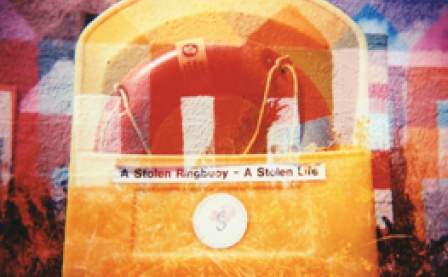On his countless CD-Rs, 12-inches, and cassettes, as well as collaborations with the likes of Matthew Bower of Skullflower, Neil Campbell of Vibracathedral Orchestra, and the telepathic Simon Wickham-Smith, Richard Youngs has helped to provide what The Wire described as “the map co-ordinates for much of what passed for a post-punk UK underground during much of the 80’s and 90’s.” He can do achingly beautiful mantras of loss, as on Sapphie; chromium space odes to Jack Kirby, as on his mid-2000s Jagjaguwar releases; windy electroacoustic improvisations; obscurefaux-airs; and, most recently, Residents-style weirdo-pop on his last Jagjaguwar album, Beyond the Valley of the Ultrahits. He played bass with Jandek at the legendary recluse’s first-ever live performances, on the confident and sensitive Glasgows Sunday and Monday, and on Newcastle Sunday. On his latest for Jagjaguwar, Amplifying Host, Youngs takes yet another stylistic turn, this time into hermetic outsider folk-rock.
Youngs’ music sounds broken here, but as with Jandek’s utterly unique take on rock ‘n’ roll, its brokeness creates a sound that is thrillingly expressive in its difficulty. Alongside Youngs’ anxious, distracted acoustic guitar picking, the most characteristic sound of this album is a damaged electric guitar, pealing its mournful, inarticulate song again and again. While the electric guitar on his last recording, the limited-edition Inceptor, produced torrents of magnificent, lacerating noise, the guitar on Amplifying Host sounds either seriously broken or has undergone some profound trauma, as if it has been left with a single twisted string, able to produce only one note at a time, ambivalent and bent, bouncing away like a broken spring. This bend in the guitar string, this shape in time, is a motion Youngs seems compelled to repeat. Is it perhaps a meditation? Or a compulsion born of trauma?
Youngs also seems to be in hiding. He obscures his modest voice through multitracking, turning his lyrics into shivering x-rays of themselves. His words are refracted into their constituent sound-colors, each delicate whispered syllable intoned simultaneously, given deliberate space horizontally, but layered and obscured vertically. His manipulated words sometimes sync up over the length of long, open vowel noises, but then veer apart, ending on different consonants as different words or shooting off and disappearing entirely. This editing has the effect of lending an incredible expressive and syntactic tentativeness to Youngs’ voice. It sounds like he is learning to sing again.
The snatches of lyrics you can make out here and there overlap across the songs. Not many words can be distinguished, and those that do — “I know,” “feel,” “return, return,” “days” — scramble in the unconscious like scraps of text in a collage. Paired with that blurry, intermittent guitar, Youngs’ latest songs truly fuck you up. The 13-minute “Too Strong for the Power,” especially, is a swamp in the middle of this album, passively sucking all the other songs into itself. The album does contain some relatively lucid moments, such as “Tesselations,” which incorporates beautiful processed flute alongside that busted guitar and a riveting, wordless, open-mouthed chant at its center; and “Holding on to the Sea” which features a bass guitar thudding tunelessly like a dropped book. A special pleasure on many of the tracks is the deeply sympathetic drumming and percussion from Damon Krukowski (Damon & Naomi), composed mostly of exquisitely restrained percussion accents and ambient cymbal washes.
Perhaps it’s a fallacy to ascribe the meaning of these sophisticated compositions to psychological distress. After all, I’ve been burned before. In the late 90s, suffering from a depression that seemed more than a few notches above everyday teen angst, I sent a check to Corwood industries to buy a box of Jandek’s CDs. I included a letter to Jandek telling him that I was worried that I connected so much to his music, because his songs have been so deeply tortured over so many years. His only reply was to send me back my check, which I had neglected to sign. In retrospect, I was the only one who was a mess. Jandek’s triumphant emergence as a frequent live performer and his comfortable engagement with the free-improv scene make me confident that though the songs on Youngs’ latest may sound beyond repair, they are not, ultimately, broken.
More about: Richard Youngs




